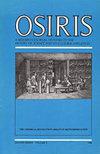Organizing the Marketplace
IF 1
3区 哲学
Q2 HISTORY & PHILOSOPHY OF SCIENCE
引用次数: 0
Abstract
This essay engages a classic debate about the way nineteenth-century biology was informed by contemporaneous developments in political economy, and vice versa. However, rather than argue for a convergence between classical liberalism and Darwinian evolution, this essay traces the way that the concept of organization moved between both fields of discourse. Compared to the theory of evolution by natural selection, the logic of organization was far more teleological and, often, authoritarian. Instead of asserting that competition for access to scarce resources among autonomous agents yields adaptive outcomes in the population at large, it held that organic entities inexorably tend to develop from a state of simplicity to one of complexity. Moreover, it stressed the production of hierarchical structures wherein the whole was privileged over its constitutive parts, in biology as well as society. It is my thesis that the logic of organization proved especially attractive in debates about the transition from free-market to corporate capitalism, providing a powerful means to describe, discuss, and dispute the centralization, rationalization, and bureaucratization that contemporary observers often took to be characteristic of a distinctly modern political economy.组织市场
这篇文章引发了一场经典的辩论,关于19世纪生物学是如何被同时代的政治经济发展所影响的,反之亦然。然而,本文并没有争论古典自由主义和达尔文进化论之间的趋同,而是追溯了组织概念在两个话语领域之间的移动方式。与自然选择进化论相比,组织逻辑更具目的论,而且往往是专制的。它没有断言自主主体之间争夺稀缺资源的竞争会在广大人群中产生适应性结果,而是认为有机实体不可避免地倾向于从简单状态发展到复杂状态。此外,它强调了等级结构的产生,在生物学和社会中,整体优先于其组成部分。我的论点是,在关于从自由市场向企业资本主义过渡的辩论中,组织逻辑被证明特别有吸引力,它提供了一种强有力的手段来描述、讨论和争议中央集权、合理化和官僚化,而当代观察家往往认为这是一个明显的现代政治经济的特征。
本文章由计算机程序翻译,如有差异,请以英文原文为准。
求助全文
约1分钟内获得全文
求助全文
来源期刊

Osiris
管理科学-科学史与科学哲学
CiteScore
1.10
自引率
0.00%
发文量
18
审稿时长
>12 weeks
期刊介绍:
Founded in 1936 by George Sarton, and relaunched by the History of Science Society in 1985, Osiris is an annual thematic journal that highlights research on significant themes in the history of science. Recent volumes have included Scientific Masculinities, History of Science and the Emotions, and Data Histories.
 求助内容:
求助内容: 应助结果提醒方式:
应助结果提醒方式:


